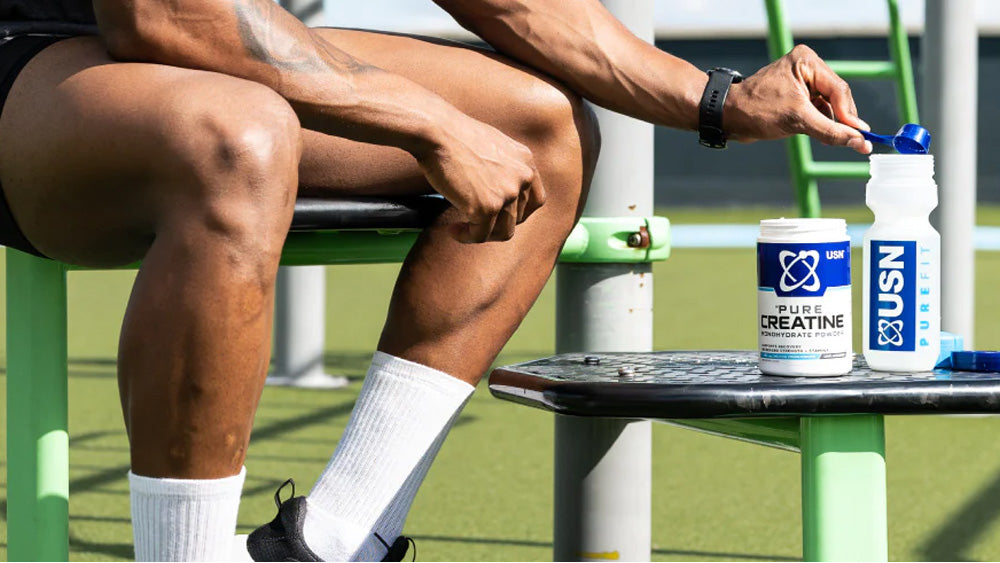Considering Creatine?
Even though creatine is one of the most researched substances in the fitness world, various misconceptions exist about this supplement. Before debunking some of the most common misconceptions, it is essential to have a basic understanding of what creatine is and how it can enhance your health and fitness journey.
What is creatine?
Creatine is created from amino acids and is primarily found in your body's muscles and the brain. Creatine is a combination of three amino acids: arginine, glycine, and methionine. Your body produces creatine through your liver and kidneys after you eat protein. Even though creatine is found naturally in your body and certain foods, such as red meat, chicken and fish, you would have to eat an excessive amount of these proteins to receive the quantity available in most creatine supplements.
What does creatine do?
Let’s go back to the basics: to understand how crucial creatine is to your body and how it can enhance your health and fitness journey, you should have a basic understanding of the cellular energy cycle.
Your body has three primary energy systems: the anaerobic, the APT-phosphagen, and the aerobic systems. All these systems use a molecule called adenosine triphosphate (ATP) to release energy. ATP is your body’s primary energy source and fuels all cells in your body. Creatine increases ATP energy production in the body. Most of your body’s creatine stores are located in your muscles in the form of phosphocreatine. When creatine stores in your muscles are depleted, your energy levels will automatically drop.
Benefits of using creatine
Simply put, creatine helps fight fatigue during workouts, helping you work out more intensely and for longer. Some of the other benefits of creatine are highlighted below.
Improves athletic performance
Whether you are a sprinter, weightlifter, swimmer, or cyclist, creatine supplements can enhance your performance. Your body needs energy—or ATP—to perform high-intensity exercises. You can only store enough ATP for eight to ten seconds of high-intensity exercise. When the amount of creatine phosphate in your muscles is depleted, it will directly impact your exercise performance, as your body cannot resynthesise ATP at the rate needed to sustain high-intensity exercise. In basic terms: creatine can enhance exercise performance in high-intensity, short-duration training by increasing the body’s ability to produce ATP.
Increases muscle mass and strength
Supplementing with creatine can increase the phosphocreatine/creatine ratio in skeletal muscle tissue, which improves the body’s ability to resynthesise ATP production rapidly during high-intensity exercises. Ninety-five percent of all creatine is stored in your muscles, encouraging muscle growth and strength when paired with regular high-intensity training.
Repairs damage after injury
A study conducted by a group of researchers and published in the Journal of the International Society of Sports Nutrition confirmed that creatine supplementation can enhance muscle recovery after exercise-induced muscle damage in healthy individuals. Fourteen male participants were evaluated for this study.
Creatine myth busters
Creatine is an anabolic steroid
It is no secret that combining creatine with high-intensity exercise can increase muscle mass, which is probably where the confusion between creatine and steroids originated. As mentioned, creatine is produced from amino acids, a naturally occurring compound. Steroids, on the other hand, are manufactured chemicals. A creatine supplement is just basically a top-up to what you already consume through certain proteins.
Fact: there is no relation between creatine and steroids.
Creatine causes kidney damage
One of the most common myths is that creatine causes kidney damage. Athletes often consume creatine with a high-protein diet to enhance their strength and lean mass. According to a 12-week study conducted by researchers and published in the Journal of the International Society of Sports Nutrition, creatine does not have a negative impact on people’s kidneys who follow a high-protein diet and do resistance training.
Unlike proteins, when creatine is broken down, it does not involve the removal of nitrogen when excreted from the body by the kidneys. Therefore, the myth that creatine will damage your kidneys due to increased nitrogen removal is groundless.
Only athletes can use creatine
Even though creatine is prevalent among athletes, adding creatine to your diet has many benefits when you are not a professional athlete. Your muscles tend to degenerate as you age, decreasing strength and mobility. When combined with resistance training or other high-intensity training, creatine can help slow down bone mass loss as you age and keep you strong, healthy and mobile. Creatine is also helpful for daily exercise activities, such as walking.
Only men can use creatine
Even though there is a clear difference between the male and female anatomy, the role of creatine in the body remains the same for men and women. Whether you are male or female, if you want to sprint, jump, lift a weight or move your muscles, your body uses ATP for maximum output.
Creatine causes muscle cramps or dehydration
The reason why there is a misconception that creatine causes muscle cramps is that creatine amends your body’s stored water content, transporting additional water to your muscle cells. However, the move in cellular water content is minor. No research supports the myth that creatine results in dehydration and muscle cramps.
Blog provided by USN

